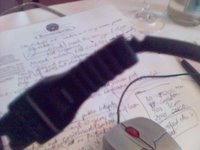 So, unexpectedly, I'm in a Dario Fo play. Turned up at the wrong audition at South London Theatre, and found myself with the part of Egerton, a spymaster, in "Elizabeth: Almost By Chance a Woman", a foul-mouthed political farce set in the latter days of Elizabeth I.
So, unexpectedly, I'm in a Dario Fo play. Turned up at the wrong audition at South London Theatre, and found myself with the part of Egerton, a spymaster, in "Elizabeth: Almost By Chance a Woman", a foul-mouthed political farce set in the latter days of Elizabeth I.The good news is I'm one of only six actors, we have a great director, and lots of ambitious plans for props, set and costumes. And it might be funny!
The bad news? Well, I'm feeling a lot more exposed now I'm off the chorus line. The show is on a lot quicker than I thought, so we have five weeks to get it together. It clashes with almost everything else in my life, and the rest of the family are a bit miffed.
Alos, I have to break it to the Sunday School, who said our panto was the best they'd been to, that this swear-fest might not be suitable for them (though I reckon any teenager doing the Tudors should enjoy seeing Elizabeth as a "moody, manipulative, foul-mouthed, incontinent hermaphrodite").
And I have to tell my Morris team that, yet again, I'm going to miss a lot of practice - including tonight!










